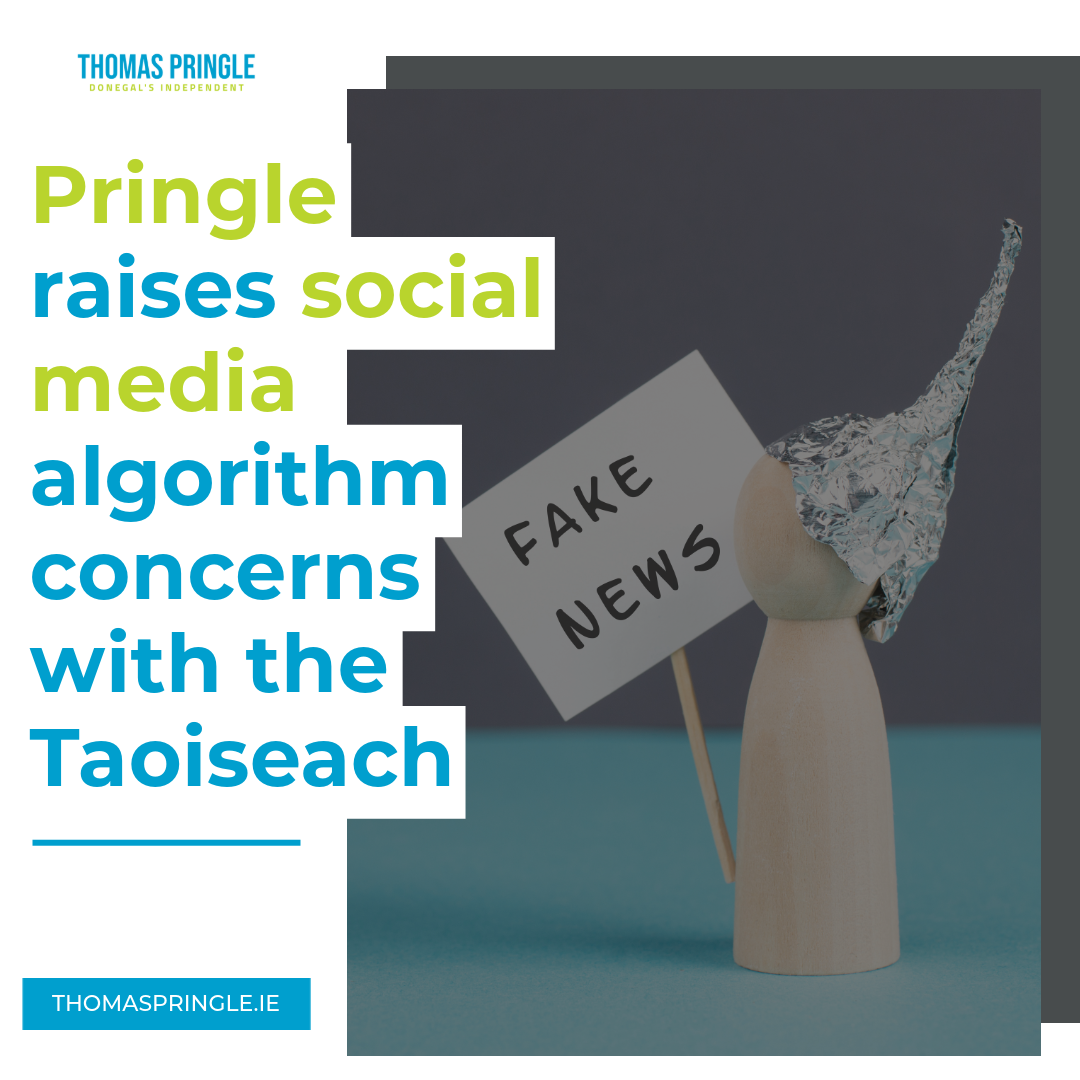- Pringle: We need a policy that recognises the importance of inshore fishing
- Pringle: Disabled people and carers face crisis of State neglect
- Pringle: Failed FF/FG housing policies forcing people to put their lives on hold
- Pringle welcomes Donegal council motion on Occupied Territories Bill: ‘We cannot stand by in the face of genocide’
Pringle raises social media algorithm concerns with the Taoiseach
- Updated: 2nd May 2024

Independent TD for Donegal, Thomas Pringle, has called on Government to take steps to control the spread of misogynistic and extremist content on social media, citing a recent study that showed how algorithms used by social media companies amplify that content.
Addressing the Taoiseach in the Dáil on Tuesday, Deputy Pringle said: “I know many of us in this chamber are extremely concerned about the reactionary right-wing content, conspiracy content and misogynistic content that has become increasingly popular on social media in recent years and which is starting to filter in, and contribute to, societal issues in Ireland today.
“Unfortunately, such views have always been present in society, however, due to social media, it is now possible to create and spread anti-progressive views more widely and rapidly than ever before.
“Taoiseach, I wanted to bring to your attention a recent study from DCU’s Anti-Bullying Centre, which has shown that the algorithms used by social media platforms, such as YouTube and TikTok, are rapidly amplifying misogynistic and male supremacist content, as well as reactionary right-wing and conspiracy content, much of which is anti-transgender as well.
“The researchers of the study found that every single male social media account was fed masculinist, anti-feminist and other extremist content, irrespective of whether they sought out this content. What’s even more concerning was that they all received this content within the first 23 minutes of the experiment.
“This is extremely frightening and opens our eyes to the type of toxic and problematic content young boys and men in Ireland are exposed to every day. TikTok has over 1.5 billion active monthly users, almost half of which are under the age of 25,” he said.
The deputy raised the issue on Tuesday during Leader’s Questions.
Deputy Pringle said: “Recent statistics show a concerning increase in the incidence of sexual and gender-based harassment in schools and among young people in Ireland. According to Women’s Aid, there has also been an increase in the number of women reporting experiences of sexual and gender-based abuse and harassment both online and off.
“There is no doubt that there is a link between the growing abuse faced by women and girls and the recent rise in male supremacist content online as well.
“It has been shown that such content has also served as a gateway into far-right spaces. The study shows that many male accounts were also recommended reactionary right-wing content, with a focus on anti-trans and ‘anti-woke’ content and a few were also even shown conspiracy content, often regarding large-scale governmental control.
“This is incredibly alarming and it is clear that the recent rise of the far right in Ireland goes hand in hand with the rise of this content on TikTok and YouTube.
“The DCU study noted that ‘anti-feminist, male supremacist and far-right narratives merge together into a seamless and mutually compatible set of talking points, collectively underpinned by the logic of conspiracy’.
“The research paper is a worrying and disturbing read and I was truly horrified to discover the type of content and messages that young Irish men are being exposed to. It really is no wonder that we are seeing the devastating effects of this in reality,” he said, saying messages like ‘masculinity is under threat because of female empowerment and government brainwashing’, or the idea of ‘the family is threatened by LGBTQI+ rights’ were “incredibly concerning”.
Deputy Pringle asked the Taoiseach how he was going to address the matter.
The Taoiseach, Simon Harris, thanked Deputy Pringle for raising what the Taoiseach called, “an extraordinarily serious issue.” He said he will make it his business to familiarise himself with the report and called online safety for children, young people and all citizens a key priority for Government.
In his response, the Taoiseach said there needs to be protections in place and legal obligations on social media companies with sanctions if they do not comply. He said that is what the Government intends to do through Coimisiún na Meán, by turning the draft online safety codes the Coimisiún is developing into full online safety codes with full legislative effect.



